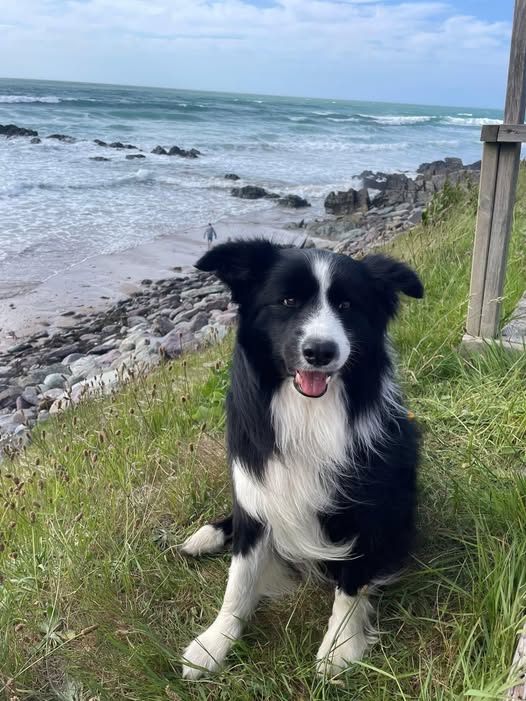Farewell to My Best Friend: Remembering Max and Navigating the Grief of Pet Loss

Farewell to My Best Friend: Remembering Max and Navigating the Grief of Pet Loss
The photo captures a moment frozen in time: a black and white Border Collie sitting proudly on a grassy cliff overlooking a rugged coastline. The ocean waves crash against rocky shores under a partly cloudy sky, and the dog’s tongue lolls out in a joyful pant, his eyes sparkling with that unmistakable spark of life. This was Max, my faithful companion, in one of our favorite spots—a secluded beach where we’d spend hours running, playing fetch with driftwood, and simply sitting together, watching the world go by. Yesterday, that spark faded forever. Max, who had been by my side for five incredible years, left this world, leaving behind a void that’s as vast and deep as the sea in that picture. He gave me endless happiness and joy, filling my days with laughter, loyalty, and unconditional love. Now, there’s a big hole in my heart. I’m so sad, and I miss him terribly. But Max will always be in my heart, and I hold onto the belief that one day, we’ll run together again—perhaps in some eternal field where the grass is always green and the sun never sets.
Losing a pet isn’t just saying goodbye to an animal; it’s losing a family member, a confidant, and a source of pure, unfiltered joy. Max came into my life five years ago as a energetic puppy from a local shelter. I remember the day I adopted him vividly—he bounded into the room with that classic Border Collie intelligence shining in his eyes, his black and white coat fluffy and full of promise. From that moment, he became my best friend. We shared everything: morning walks in the park, lazy afternoons on the couch, and those exhilarating runs along the beach where he’d chase seagulls with boundless energy. Max had a way of making even the toughest days better. If I was stressed from work, he’d nuzzle against me, his head resting on my lap as if to say, “It’s okay, I’m here.” His antics—stealing socks, herding imaginary sheep in the backyard—brought laughter into my home. For five years, he was the constant in my life, teaching me about patience, forgiveness, and living in the moment.
But yesterday, everything changed. Max had been slowing down in recent months, his once-vigorous runs turning into gentle strolls. The vet diagnosed him with a heart condition, common in his breed, and we managed it with medication and love. Still, I wasn’t prepared for the end. It came suddenly—a seizure in the night, and despite rushing him to the emergency clinic, there was nothing more they could do. Holding him as he took his last breath, I whispered how much I loved him, how he’d been the best part of my life. The silence that followed was deafening. Coming home without him felt wrong; his bed empty, his toys scattered like forgotten memories. The grief hit like a wave, crashing over me with sobs that seemed endless. There’s a big hole in my heart now, a space that Max filled so completely. I miss his wet nose nudging me awake, his excited barks at the door, the way he’d tilt his head when I talked to him as if he understood every word.

This pain is universal among pet owners, yet it’s often underestimated by those who haven’t experienced it. According to experts, grieving a pet can be as intense as losing a human loved one because pets offer unconditional love without the complexities of human relationships. In my case, Max wasn’t just a dog; he was my emotional anchor. Research shows that pet loss grief can manifest in stages similar to human bereavement: denial, anger, bargaining, depression, and acceptance. Right now, I’m deep in depression, replaying every moment, questioning if I could have done more. But stories from others who’ve walked this path offer solace. One woman shared how losing her cat after 15 years left her in denial for weeks, but journaling memories helped her move forward. Another recounted the anger after her dog’s sudden death, finding peace through support groups where people understood the depth of the bond.
Reflecting on our time together helps ease the ache. Max’s arrival coincided with a difficult period in my life—I’d just gone through a breakup and was feeling isolated. Adopting him was impulsive, but it changed everything. Our first adventure was a hike in the nearby hills, where Max’s enthusiasm pulled me out of my funk. He’d dash ahead, then circle back to check on me, his tail wagging like a metronome of encouragement. Over the years, we explored countless trails, beaches, and parks. The photo from our last trip to the coast captures his essence perfectly—sitting regally, tongue out, ready for the next play session. We’d run along the shore, him splashing in the waves, barking at the foam as if challenging the ocean itself. Those runs were our ritual, a way to connect without words. Even in his later years, when arthritis slowed him, he’d still try to keep up, his spirit unbroken.

Max taught me invaluable lessons. From him, I learned loyalty— he was always there, no matter what. Joy came in simple things: a belly rub, a game of tug-of-war, or just sitting together watching the sunset. He forgave instantly, whether I was late for a walk or accidentally stepped on his paw. In a world full of conditional relationships, Max’s love was pure. Studies on human-animal bonds confirm this: pets reduce stress, lower blood pressure, and combat loneliness by releasing oxytocin, the “love hormone.” For me, Max was therapy on four legs. During the pandemic, when isolation was mandatory, he was my constant companion, turning solitary days into shared adventures in the backyard.
The grief now is multifaceted. Physically, the house feels empty without his presence—the lack of fur on the furniture, no more food bowl to fill. Emotionally, it’s a rollercoaster. One moment, I’m smiling at a photo; the next, tears flow unbidden. Experts advise acknowledging this as normal. Wendy Van de Poll, a pet grief coach, emphasizes talking about the loss, whether to friends, family, or professionals. I’ve started journaling, writing letters to Max about our memories. Support from online communities, like Reddit’s r/Petloss, has been invaluable—reading others’ stories reminds me I’m not alone. One post described integrating the pet’s memory into daily life, like creating a memorial altar with photos and toys. I’ve done that, placing the beach photo next to his collar and favorite ball.

Coping strategies vary, but common advice includes allowing time to grieve without judgment. Some find comfort in rituals: burying ashes in a favorite spot or planting a tree in their honor. For me, I’m planning a memorial walk along our beach route, scattering some of his ashes where he loved to run. Exercise helps too—running alone now feels therapeutic, as if Max is still beside me. Therapy animals or adopting another pet later can aid healing, but experts warn against rushing, as each bond is unique. Blue Cross’s Pet Loss Support has helped thousands since 1994, offering hotlines for those in despair.
Personal stories resonate deeply. Steve’s tale of losing his cat to illness echoes my experience—he had a plan for euthanasia, making the passing peaceful. Jess, a psychology student, navigated her pet loss by focusing on positive memories and seeking comfort in nature. Tika’s story emphasizes moving forward without saying goodbye, keeping the bond alive through love and grief. These narratives validate my feelings, showing grief’s nonlinearity—waves of sadness interspersed with gratitude.

Spiritually, many find solace in believing pets await in an afterlife. The “Rainbow Bridge” poem, where pets run free until reunited with owners, brings comfort. I cling to that: “We will run together again one day.” Max’s spirit feels present in the wind on our beach, in dreams where he’s young and playful. Faith, whether religious or personal, helps bridge the gap.
As time passes, the hole in my heart may scar over, but Max’s imprint remains. He made me a better person—more patient, more loving. In honoring him, I might volunteer at the shelter where we met, helping other dogs find homes. Grief evolves, turning raw pain into cherished memories. Max’s legacy is the joy he brought, the love he taught. Though he’s gone, he’s always in my heart, and one day, in some boundless place, we’ll run side by side once more.








